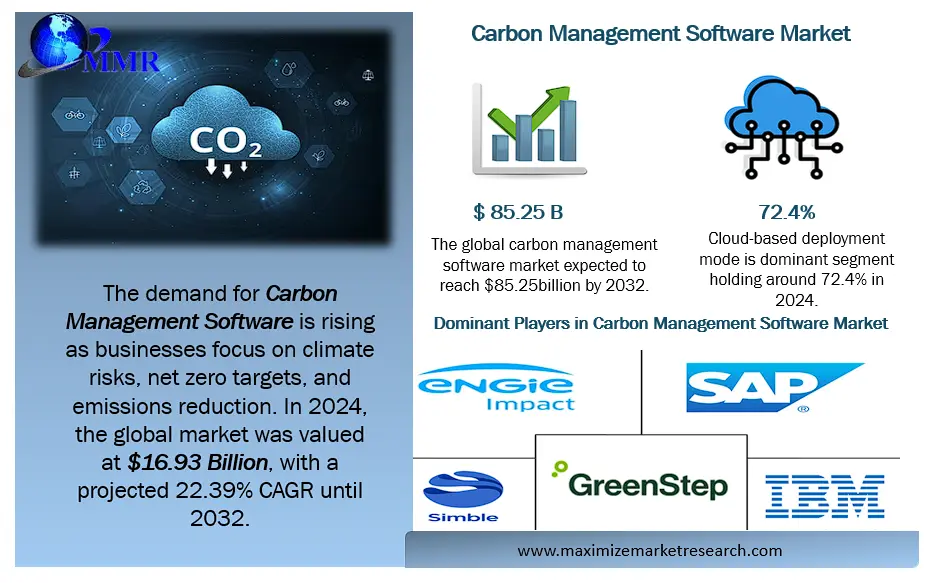The global carbon management software market Size is poised for significant growth, with projections estimating an increase from USD 16.93 billion in 2024 to USD 85.25 billion by 2032, reflecting a compound annual growth rate (CAGR) of 22.39%. This surge is attributed to escalating environmental regulations, corporate sustainability commitments, and advancements in technology facilitating efficient carbon footprint management.
Market Estimation & Definition
Carbon management software encompasses digital solutions designed to assist organizations in measuring, monitoring, and reducing their carbon emissions. These platforms integrate technologies such as artificial intelligence (AI), machine learning (ML), and the Internet of Things (IoT) to provide real-time data analytics, predictive modeling, and compliance reporting. By enabling accurate tracking of greenhouse gas (GHG) emissions, these tools support businesses in aligning with environmental regulations and achieving sustainability goals.
Get Sample Copy Of The Report : https://www.maximizemarketresearch.com/market-report/global-carbon-management-software-market/108489/
Market Growth Drivers & Opportunities
Several key factors are propelling the expansion of the carbon management software market:
- Regulatory Compliance: Governments worldwide are implementing stringent environmental policies, mandating organizations to monitor and report their carbon emissions. Compliance with frameworks such as the Paris Agreement and national carbon reduction targets necessitates the adoption of robust carbon management solutions.
- Corporate Sustainability Initiatives: Businesses are increasingly prioritizing environmental, social, and governance (ESG) criteria, integrating sustainability into their core strategies. Carbon management software enables companies to transparently report their environmental impact, enhancing stakeholder trust and brand reputation.
- Technological Advancements: The integration of AI, ML, and big data analytics enhances the capabilities of carbon management platforms, allowing for more accurate emissions tracking and predictive analysis. Cloud-based solutions offer scalability and cost-effectiveness, making them accessible to organizations of varying sizes.
- Economic Incentives: Effective carbon management can lead to operational efficiencies, cost savings, and access to green financing opportunities, providing a competitive advantage to proactive organizations.
Segmentation Analysis
By Deployment Mode:
- Cloud-Based: Dominating the market with approximately 72.4% share in 2024, cloud-based solutions offer flexibility, scalability, and remote accessibility, catering to the dynamic needs of modern enterprises.
- On-Premises: Preferred by organizations with specific data security and compliance requirements, on-premises solutions provide greater control over data management.
By Enterprise Size:
- Large Enterprises: These organizations are leading adopters of carbon management software, driven by extensive regulatory obligations and the pursuit of comprehensive sustainability strategies.
- Small & Medium Enterprises (SMEs): SMEs are increasingly embracing carbon management tools to enhance operational efficiency and meet emerging regulatory standards.
By End-User Industry:
- Energy & Utilities: Facing significant regulatory scrutiny, this sector utilizes carbon management software to monitor emissions and optimize energy consumption.
- Manufacturing: With substantial carbon footprints, manufacturing industries employ these tools to streamline processes and reduce emissions.
- Transportation & Logistics: The need to track and mitigate emissions across supply chains drives adoption in this sector.
- Construction & Infrastructure: Sustainability goals and regulatory compliance necessitate the use of carbon management solutions in construction projects.
- IT & Telecommunications: As digital infrastructure expands, this sector leverages carbon management software to monitor energy usage and emissions.
By Application:
- Energy: Accounting for the largest market share, energy applications focus on optimizing consumption and integrating renewable sources.
- Greenhouse Gas Management: Tools in this category facilitate comprehensive tracking and reporting of GHG emissions.
- Air Quality Management: These applications monitor pollutants, ensuring compliance with air quality standards.
- Sustainability: Encompassing broader environmental initiatives, sustainability applications support long-term ecological goals.
Country-Level Analysis
United States:
The U.S. leads the carbon management software market, driven by rigorous environmental regulations and a strong emphasis on corporate sustainability. Federal initiatives and investor pressures compel organizations to adopt advanced carbon tracking and reporting tools. The presence of major technology providers further accelerates market growth.
Germany:
Germany’s commitment to the European Union’s Green Deal and its national climate targets positions it as a significant market for carbon management software. The country’s robust manufacturing sector and progressive environmental policies necessitate sophisticated emissions monitoring and management solutions.
Competitive Landscape
The carbon management software market is characterized by a mix of established technology firms and specialized sustainability solution providers. Key players include:
- SAP SE: Offers comprehensive sustainability management solutions, integrating carbon tracking into enterprise resource planning systems.
- IBM: Provides AI-driven environmental intelligence platforms, facilitating predictive analytics and risk assessment.
- Microsoft Corporation: Delivers cloud-based sustainability tools, enabling organizations to monitor and reduce their carbon footprints.
- Oracle Corporation: Develops integrated applications for environmental compliance and sustainability reporting.
- Sphera Solutions Inc.: Specializes in environmental, health, and safety (EHS) software, offering robust carbon management capabilities.
These companies are investing in research and development to enhance their offerings, focusing on user-friendly interfaces, real-time data analytics, and seamless integration with existing business systems.
To view Full Report : https://www.maximizemarketresearch.com/market-report/global-carbon-management-software-market/108489/
The global carbon management software market is on an upward trajectory, fueled by regulatory mandates, corporate sustainability endeavors, and technological innovations. As organizations worldwide strive to meet environmental goals and stakeholder expectations, the demand for sophisticated carbon management solutions is set to escalate. Companies that proactively adopt these tools will not only ensure compliance but also gain a competitive edge in the evolving green economy.



